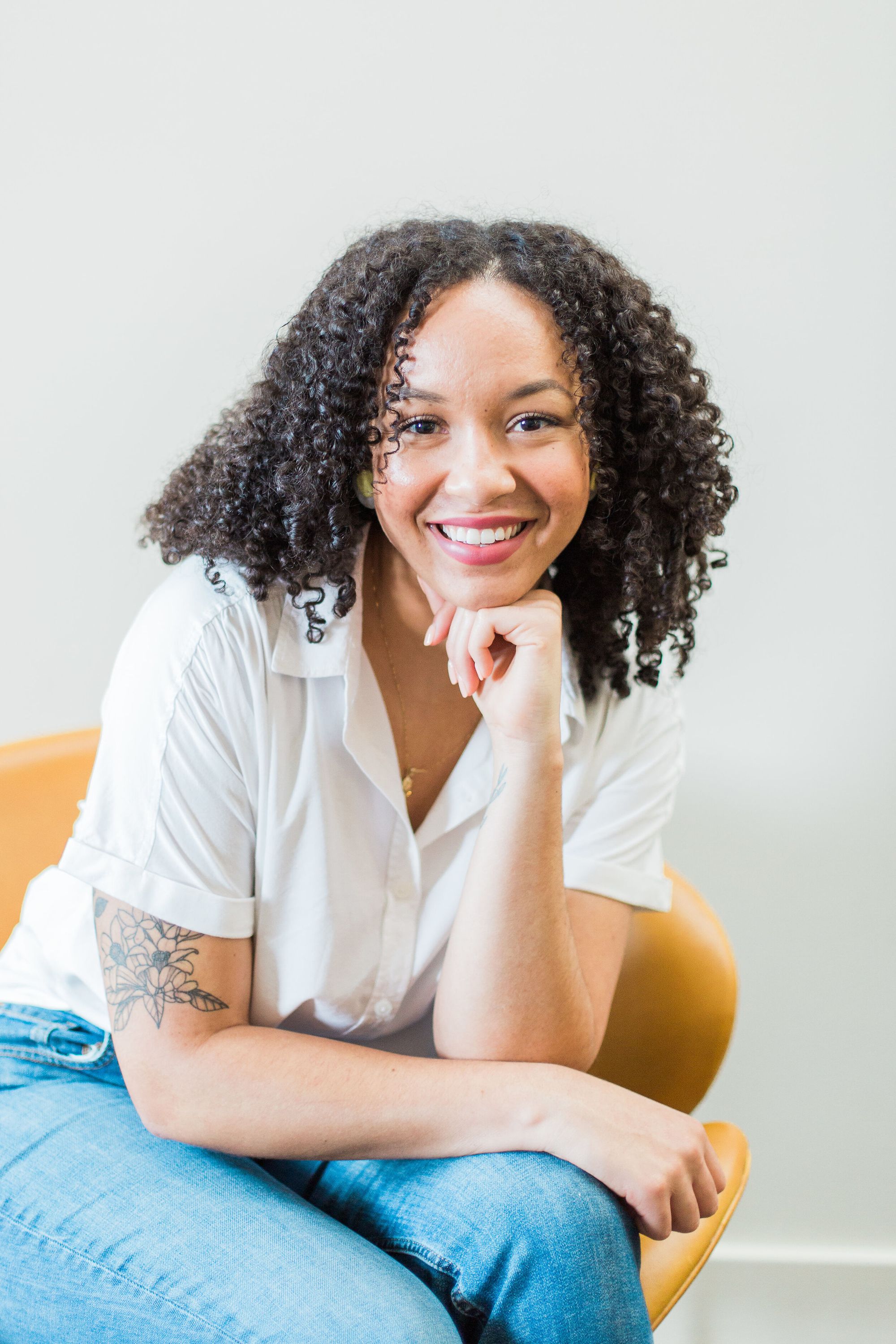Natasha Samuel was having the usual crisis every soon-to-be college grad has and wondering “what am I going to do for the rest of my life?” But instead of applying for jobs, Samuel thought back to some sage advice from her boss—and now mentor—at the first college internship she took: “If you want to build your own dream, you can.”
From that day forward, the seed was planted and as Samuel tells me via email, started blossoming into the business idea that is now Sol Studio—a social media marketing company that helps small businesses shine.

Read on to learn how Samuel skipped the business plan to take a DIY approach to her business instead, and what she learned about money, hiring, and self-confidence along the way.
On taking the DIY approach…
I didn’t have a business plan at all. I was only thinking of ways I could figure it out off the cusp by DIY’ing my branding, bootstrapping my business set up, and going with my intuition early on. If something didn’t feel right or serve me at that time, I changed it whether it was a client I was pricing for my packages or the services I offered.
On coming up with the name…
I knew I didn’t want to use my own name, but I wanted the business to still feel personal to me. I thought of the things that made me who I am like loving the sunshine and being raised in Florida. I kept thinking of bright, cheery, and yellow when dreaming up my branding. Sol, which means sun in Spanish, seemed like the perfect way to name the bright brand I wanted to create. Sol Studio was the only name I thought of or considered and it just stuck. Like a lot of my early business decisions, I went with my gut. My biggest advice when naming a business is not forcing it, you’ll know the right fit when you come across it.
On the set-up process…
During the winter break before my last semester of college, I bootstrapped my business to get it up and running in a month. I launched a Squarespace website, built out some basic packages and rates, created an account on Upwork for freelance work, and set up the tools I planned to use for my business. I listed my business as an LLC six months after graduating from college.
In hindsight, I wish I would’ve separated my bank accounts and hired an accountant first thing. It may be scary to hire before you start making money, but my first tax season would've been so much smoother with some help.
On the research before launch…
The main research I did as an experienced college student (who had never considered starting a business) actually started inside Facebook Group communities. Inside these groups, I would learn from other people’s questions and see what other social media managers were doing. Not only did I make connections in those groups that would eventually become clients, but I learned from the “market research” I observed in the group. It was a great way to understand what my ideal clients wanted while also planning ahead to avoid the mistakes some entrepreneurs were facing.

On self-funding…
I didn’t save any money ahead of time since I was still supporting myself off financial aid and was abruptly let go from my part-time job which prompted me to start Sol Studio sooner than I thought. On one side of the spectrum, I was glad I started when I did. On the other side of that spectrum, I do wish that I had at least a few months of expenses saved up so I wasn't as stressed to take on work that I didn't really enjoy just to make ends meet. I had to make a major sacrifice to move back home six months into my business. I knew I either had to get a part-time job or make other sacrifices to ensure I was building a business that was actually in line with my goals and not just a freelancing business that made ends meet.
On the biggest money mistakes…
Not separating my money earlier. Because of this, I didn't really know how much money I was making or how much money I really should be setting aside for taxes which meant that my first tax season was a low blow financially. I always tell new entrepreneurs the first thing you should do is separate your accounts and be sure that you have a tax accountant on your team who’s handling the finances of your business correctly.
Another tip is to stick to your packages and pricing. In the first few months of my business, I was just excited to be making money from my passion. But that led me to take on work I wasn't passionate about which burnt me out. It's important that you take the time to map out what your hourly rate is to ensure that your package reflects that and stick to it. Even if you don't have a ton of experience and you were young like me, you deserve to be paid enough to support yourself, set aside for taxes, and invest back into your business.
On diving in, head first…
I drove right into building my business after my last long-term internship ended. I didn't have the time to save up or to make a business plan. In a lot of ways, I'm grateful that I didn't have to worry about leaving a job or anything that distracted me from building my business. Since I didn't really have much to lose and I was still early in my career, I knew it was worth a try which really helped me be scrappy during those first few months of the business.
I highly recommend taking the time to map out a savings plan for an emergency fund for those months where you might only be investing what you make back into your business (which is most likely going to be the first full year of business). This is why I had to make a sacrifice to move back home to lower my expenses. I knew that getting a part-time job was just going to distract my energy from building my business and I'm grateful I made that decision. But I also feel like if you're fortunate to have a nine-to-five that can fund your business then that's a great option.
I put a lot of pressure on myself early on to hustle as hard as I could to make ends meet. This led to a lot of burnout early on in my business. If I had been charging enough or had money saved up ahead of time then I could have avoided that.
On how much she paid herself…
Early on, because I didn't separate my accounts, I literally invested whatever I didn't need for my basic needs back into my business. I definitely don't recommend doing this and now I actually do set aside enough to pay myself each month.
On hiring a team…
I have a team of four right now which I've had for about a year. The hiring process has been simpler than I thought it would be. If I couldn't imagine messaging or talking to that person on a regular basis, I knew it wasn't going to be a good fit long-term. My biggest advice for outsourcing is to start with a role that you know will have some type of result or return to your business directly. For example, I knew there's no way I would have started my podcast without investing in a Podcast manager that was going to help me support the show. That's now become such a big part of my brand which made it 100% worth that investment even though it was the biggest retainer I'd ever supported.
During the hiring process, I also realized how important it is to stay organized as a business owner on the back end and track your processes. The more you communicate with your team, the better result you're going to get. And there's going to be a lot of learning. They just can't read your mind overnight. So be patient and also practice your communication skills with them.

On hiring an accountant…
As someone who was an anxious mess just thinking about managing my finances, hiring an accountant and a bookkeeper were two of the best decisions I ever made in my business. Not only do they help me review my expenses and make sure everything was allocated properly, I'm able to be stress-free during tax season knowing that I've already saved the right amount and that everything is where it should be in my books. I use Wave for all my invoicing and for my bookkeeping and I love that it's an all-in-one tool that's easy to use for myself and for my clients.
On the biggest learning curve…
Realizing that rest is essential. It's so easy to get excited about all the things going on in your business and then forget to fill up your own cup. Until I realized that I had adrenal fatigue, I wasn't prioritizing my rest and personal boundaries between my business. Prioritizing rest has been the biggest difference-maker to ensure that I'm pouring into my students and my clients well and not running myself to the point of burnout.
On having mentors…
The woman that inspired my business during my first internship became my mentor as I took on entrepreneurship. She was so incredibly helpful with cheering me on, answering any of my questions, and is still a resource for me to this day.
I waited until I knew I needed a business coach to invest. I think business coaches can be hyped up in the online space. I wanted to make sure I was choosing the right person who was actually a few years ahead of where I eventually wanted to be. Simply by investing in myself, I have seen my biggest months of growth and change just by having a new pair of eyes and a new perspective in my business.
I highly recommend investing in a business coach only when you're ready financially and only when you know you found the right person who also speaks your language.
On marketing and brand awareness…
Since Instagram is what I do for my business, it's been a huge part of how I market my business. My Instagram grid and page is essentially what attracts clients to my work or entices students to invest in my courses. My Instagram account has attracted speaking engagements, help me book clients, and reach major launch goals for my digital products. I use my Instagram account along with my email marketing and podcast to build my brand and markets my audience.
One of the first additions to my team was actually a graphic designer who really helped me get more creative when it came to my Instagram content while also taking some of it off my plate—I manage so many Instagram accounts for my clients. I found that for me the biggest thing is to build a community that I serve well through educational content but also being myself and letting my personality shine.
On the one thing she didn’t do in the setup process…
One of the tools I wish I would have been listed even sooner is a Customer Relationship Management (CRM) platform for my clients. I was so scrappy by using a ton of different free tools for managing the onboarding and offboarding client process. But little did I know, I was wasting so much of my time juggling between different tools. Investing in a tool like Dubsado has helped me streamline my client management, while also ensuring they're getting a better experience as a Sol Studio client. I think it's really important to be smart with what you invest in early on, this is one of the first tools I should have invested in sooner.
On business advice for new entrepreneurs…
Stay in your own lane. Make sure you're not consuming too much of people that are in your own industry. It can be great to get inspired and to learn from others, but be sure that you're making business decisions that feel good to you. You can do any marketing technique, funnel idea, or products the way that feels good for your brand.
Just because it works for a big-name marketing guru, doesn't mean that you have to use it to be successful in business, too. I actually mute a lot of other social media manager and educator accounts. Not because I don't love them, but because I like to stay true to my brand voice and be sure that I'm not being influenced to do what everyone else is doing.
On her #1 piece of financial advice…
Make sure that you have emergency funds for your personal and your business expenses, too. As your business grows and scales, you want to make sure that you can support yourself and your monthly business expenses if anything ever happens.
On advice she’d give herself…
It's okay to say no. It's a lesson that I learned early on, but saying no to opportunities that didn't serve me or just didn't excite me was what opened doors to bigger clients and bigger opportunities. As an early business owner, it's so easy to want to say yes to everything that comes your way. But when you say yes to something that's not a good fit, you're not making space for a better opportunity in the future.
THIS ARTICLE ORIGINALLY APPEARED ON CREATE & CULTIVATE. IT IS REPUBLISHED WITH PERMISSION.

